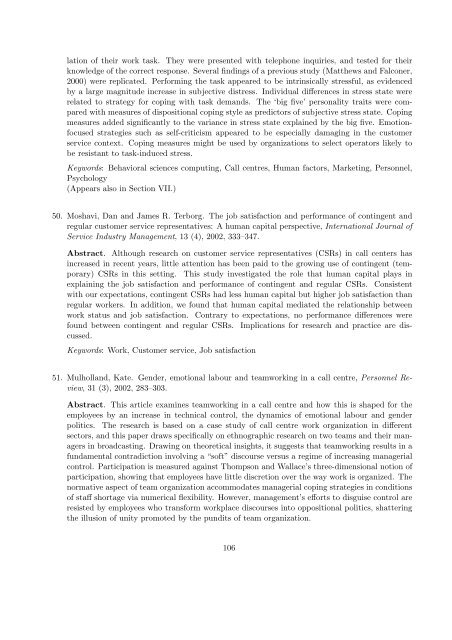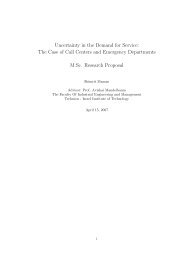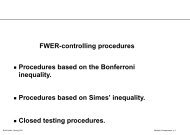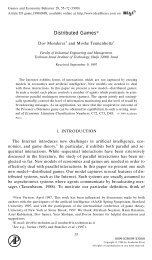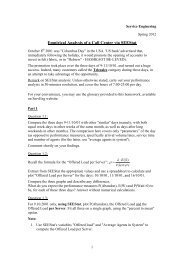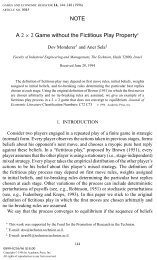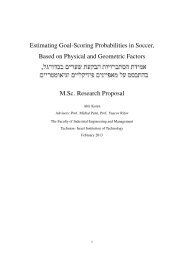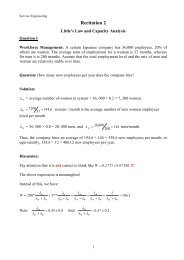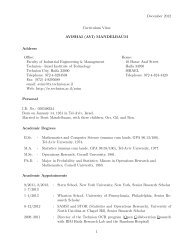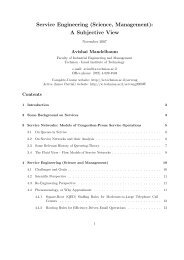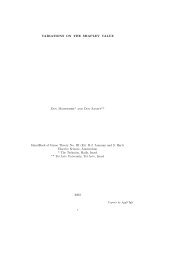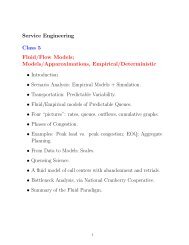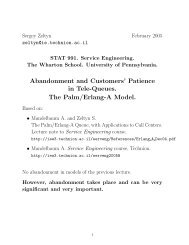CALL CENTERS (CENTRES) - Faculty of Industrial Engineering and ...
CALL CENTERS (CENTRES) - Faculty of Industrial Engineering and ...
CALL CENTERS (CENTRES) - Faculty of Industrial Engineering and ...
You also want an ePaper? Increase the reach of your titles
YUMPU automatically turns print PDFs into web optimized ePapers that Google loves.
lation <strong>of</strong> their work task. They were presented with telephone inquiries, <strong>and</strong> tested for their<br />
knowledge <strong>of</strong> the correct response. Several findings <strong>of</strong> a previous study (Matthews <strong>and</strong> Falconer,<br />
2000) were replicated. Performing the task appeared to be intrinsically stressful, as evidenced<br />
by a large magnitude increase in subjective distress. Individual differences in stress state were<br />
related to strategy for coping with task dem<strong>and</strong>s. The ‘big five’ personality traits were compared<br />
with measures <strong>of</strong> dispositional coping style as predictors <strong>of</strong> subjective stress state. Coping<br />
measures added significantly to the variance in stress state explained by the big five. Emotionfocused<br />
strategies such as self-criticism appeared to be especially damaging in the customer<br />
service context. Coping measures might be used by organizations to select operators likely to<br />
be resistant to task-induced stress.<br />
Keywords: Behavioral sciences computing, Call centres, Human factors, Marketing, Personnel,<br />
Psychology<br />
(Appears also in Section VII.)<br />
50. Moshavi, Dan <strong>and</strong> James R. Terborg. The job satisfaction <strong>and</strong> performance <strong>of</strong> contingent <strong>and</strong><br />
regular customer service representatives: A human capital perspective, International Journal <strong>of</strong><br />
Service Industry Management, 13 (4), 2002, 333–347.<br />
Abstract. Although research on customer service representatives (CSRs) in call centers has<br />
increased in recent years, little attention has been paid to the growing use <strong>of</strong> contingent (temporary)<br />
CSRs in this setting. This study investigated the role that human capital plays in<br />
explaining the job satisfaction <strong>and</strong> performance <strong>of</strong> contingent <strong>and</strong> regular CSRs. Consistent<br />
with our expectations, contingent CSRs had less human capital but higher job satisfaction than<br />
regular workers. In addition, we found that human capital mediated the relationship between<br />
work status <strong>and</strong> job satisfaction. Contrary to expectations, no performance differences were<br />
found between contingent <strong>and</strong> regular CSRs. Implications for research <strong>and</strong> practice are discussed.<br />
Keywords: Work, Customer service, Job satisfaction<br />
51. Mulholl<strong>and</strong>, Kate. Gender, emotional labour <strong>and</strong> teamworking in a call centre, Personnel Review,<br />
31 (3), 2002, 283–303.<br />
Abstract. This article examines teamworking in a call centre <strong>and</strong> how this is shaped for the<br />
employees by an increase in technical control, the dynamics <strong>of</strong> emotional labour <strong>and</strong> gender<br />
politics. The research is based on a case study <strong>of</strong> call centre work organization in different<br />
sectors, <strong>and</strong> this paper draws specifically on ethnographic research on two teams <strong>and</strong> their managers<br />
in broadcasting. Drawing on theoretical insights, it suggests that teamworking results in a<br />
fundamental contradiction involving a “s<strong>of</strong>t” discourse versus a regime <strong>of</strong> increasing managerial<br />
control. Participation is measured against Thompson <strong>and</strong> Wallace’s three-dimensional notion <strong>of</strong><br />
participation, showing that employees have little discretion over the way work is organized. The<br />
normative aspect <strong>of</strong> team organization accommodates managerial coping strategies in conditions<br />
<strong>of</strong> staff shortage via numerical flexibility. However, management’s efforts to disguise control are<br />
resisted by employees who transform workplace discourses into oppositional politics, shattering<br />
the illusion <strong>of</strong> unity promoted by the pundits <strong>of</strong> team organization.<br />
106


